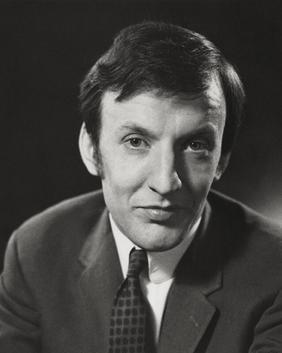Bennett, Richard Rodney
Bennett was born at Broadstairs, Kent, but was raised in Devon during World War II.[1] His mother, Joan Esther (Spink), was a pianist who had trained with Gustav Holst and sang in the first professional performance of The Planets.[2][3] His father, Rodney Bennett, (1890–1948) was a children's book author and poet, who worked with Roger Quilter on his theatre works and provided new words for some of the numbers in the Arnold Book of Old Songs.
Bennett was a pupil at Leighton Park School.[4] He later studied at the Royal Academy of Music with Howard Ferguson, Lennox Berkeley and Cornelius Cardew. Ferguson regarded him as extraordinarily brilliant, having perhaps the greatest talent of any British composer in his generation, though lacking in a personal style. During this time, Bennett attended some of the Darmstadt summer courses in 1955, where he was exposed to serialism. He later spent two years in Paris as a student of the prominent serialist Pierre Boulez between 1957 and 1959.[5] He always used both his first names after finding another Richard Bennett active in music.
Bennett taught at the Royal Academy of Music between 1963 and 1965, at the Peabody Institute in Baltimore, United States from 1970 to 1971, and was later International Chair of Composition at the Royal Academy of Music between 1994 and the year 2000. He was appointed a Commander of the Order of the British Empire (CBE) in 1977, and was knighted in 1998.[6]
Bennett produced over two hundred works for the concert hall, and fifty scores for film and television. He was also a writer and performer of jazz songs for fifty years. Immersed in the techniques of the European avant-garde via his contact with Boulez, Bennett subsequently developed his own dramato-abstract style. In his later years, he adopted an increasingly tonal idiom.
Bennett was a pupil at Leighton Park School.[4] He later studied at the Royal Academy of Music with Howard Ferguson, Lennox Berkeley and Cornelius Cardew. Ferguson regarded him as extraordinarily brilliant, having perhaps the greatest talent of any British composer in his generation, though lacking in a personal style. During this time, Bennett attended some of the Darmstadt summer courses in 1955, where he was exposed to serialism. He later spent two years in Paris as a student of the prominent serialist Pierre Boulez between 1957 and 1959.[5] He always used both his first names after finding another Richard Bennett active in music.
Bennett taught at the Royal Academy of Music between 1963 and 1965, at the Peabody Institute in Baltimore, United States from 1970 to 1971, and was later International Chair of Composition at the Royal Academy of Music between 1994 and the year 2000. He was appointed a Commander of the Order of the British Empire (CBE) in 1977, and was knighted in 1998.[6]
Bennett produced over two hundred works for the concert hall, and fifty scores for film and television. He was also a writer and performer of jazz songs for fifty years. Immersed in the techniques of the European avant-garde via his contact with Boulez, Bennett subsequently developed his own dramato-abstract style. In his later years, he adopted an increasingly tonal idiom.


